dannylim@malaysiavotes.com
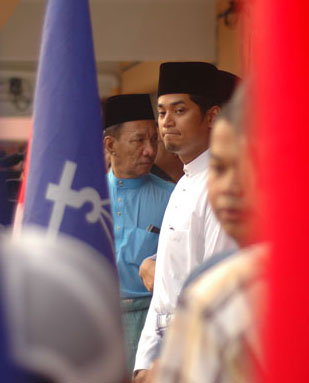
[Updated with correction at 6.30pm, 2 March 2008]
A DAY before the Feb 24 nomination day, Khairy Jamaluddin fields press questions during a kenduri at his family home in Kampung Badong, Negri Sembilan. A reporter fishes for a response to accusations by opposition parties that he is the budak nakal [the “mischievous child”] in Umno based on his bellicose antics during the Ijok by-elections in 2007.
“I’m the deputy BN [Barisan Nasional] youth chief,” says Khairy. “My job in by-elections is to create problems for the opposition. I don’t create problems in Umno. I don’t create problems in BN. Tapi saya jadi budak nakal sebab saya nak kacau pembangkang. Itu tugas saya.”
This budak nakal told MalaysiaVotes.com just before the press conference that he considered himself a “moderate Malaysian politician” at heart. Nominally just a businessman and a party politician, Khairy can claim partisan obligations. In any case an inconsistent politician is hardly a novel concept – on any side.
Khairy is practiced in dealing with the more thoroughly documented questions on his character, and will not falter in deflecting issues like his interests in the ECM Libra Capital Bhd-Avenue Capital Resources Bhd merger (which was cleared by the Public Audit Committee – with token reservations), and his confrontational tone in claiming that the Chinese communities in Malaysia would take advantage of the Malays if Umno is weak (“I was taken out of context”).
The real thrust of the litany of controversies that has trailed his political career to date comes from the assertion by both former prime minister Tun Dr Mahathir Mohamad and Opposition leader Lim Kit Siang that Khairy is the real power behind his father-in-law’s premiership.
“Not part of government”
The most elaborate and riveting account of Khairy’s reach of influence is to be found in “The Khairy Chronicles”, published online by Raja Petra Kamaruddin’s Malaysia Today. A party aide at the kenduri claimed that the writer was a young ex-Parti Keadilan Rakyat (PKR) man who recently passed away, and admitted to admiring the “quality” of the writing, if not its veracity. The Chronicles has the effect on readers, partisan or otherwise, of both diminishing Khairy’s most eloquent claims, and enhancing a fearsome reputation, which is always politically useful.
It is in this belling of the cat, especially by the former prime minister, that elicits a tinge of exasperation in an otherwise smooth-flowing interview. “Look, I…I respect him as the former PM, I don’t want to dwell too much on this issue, the only thing I’d say is this – maybe he needs a fall guy.
“Pak Lah’s [Prime Minister Datuk Seri Abdullah Ahmad Badawi] got his own policies and vision of
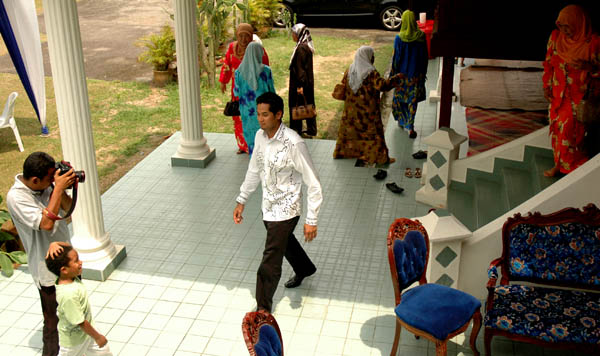 If Khairy wins this election – and indeed the Rembau parliamentary seat is widely seen as a safe seat for BN – it will be the next step in his oft-quoted ambition to be Prime Minister by the age of 40, although he had already asked for a seat before the 2004 general election.
If Khairy wins this election – and indeed the Rembau parliamentary seat is widely seen as a safe seat for BN – it will be the next step in his oft-quoted ambition to be Prime Minister by the age of 40, although he had already asked for a seat before the 2004 general election.
Should he become parliamentarian, the opposition will not miss this chance to lay into him, and likewise, Khairy will genuinely relish the battles. He will be subject to a scrutiny that cannot be fobbed off by the mere “tugas” [job] of party politics – in theory. Nevertheless, he should be held to his word.
Khairy’s sentries
You can also tell a lot about Khairy by the people he surrounds himself with. His most trusted lieutenants are Firmansyah Muhammad, aka Dax, and Wan Quoris Shah Abdul Ghani, aka Badak, both reported by online Umno-centric news site Agenda Daily to be the sentries to Khairy.
The last time I met the pair was on polling day at the Ijok by-elections in front of the Pekan Ijok police station where they were shouting and glaring at PKR supporters after an earlier altercation involving a bus of alleged phantom voters. The pair reflects as much about what Khairy values, as they represent who he wants to reach out to.
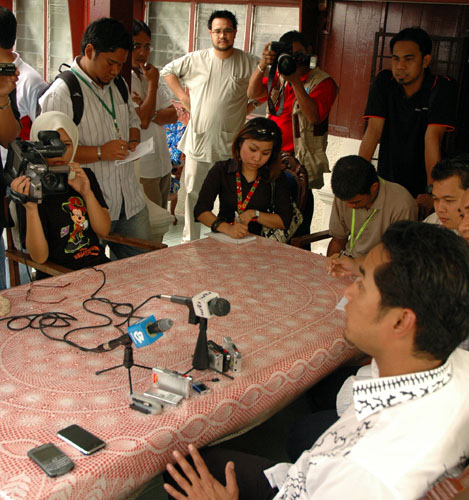
In the UK-educated, corporate-savvy, urban trim of Dax, Khairy has a sidekick that resonates with the go-getter young professional who isn’t afraid of getting down and dirty. In the UPM-educated, community-savvy, heavy-set Badak, Khairy has an advance team leader who walks Khairy’s talk of reaching out to the grassroots Malay.
On the Saturday before nomination day, Dax had been warming me up for Khairy, motor-mouthing as he does with voluble gusto. In between frank appraisals of Nurul Izzah Anwar (“She’s not gonna be a giant-killer, but she’s quite special, she’ll be a force in ten, fifteen years.”) and party-line broadsides at PAS (“They’re good religious pious ulamaks, but they’re screwed up administrators.”), he wearily fields calls from Umno youth up-and-comers pissed off that they didn’t get to contest seats in Kuala Lumpur.
“There are a lot of incumbent seats in KL, so these pemuda boys, young professionals living there are complaining why so-and-so didn’t get one. Let’s be honest, Malays in KL don’t vote. (BN) needs the Chinese. There are three reasons why Malays in KL don’t vote – one, they usually go back to Terengganu, Melaka, Kedah, Johor, wherever, (to vote). That’s the biggest reason, because we’re all like New Yorkers, we all live in Jersey.
“Two, young Malay professionals don’t give a f— about government. They have RM8,000 to RM10,000 salaries, they’re safe, they don’t care. Three, 80% of the Malaysian populace is below 45 [years old], so the critical mass is around 22, 23, 25. They’re not even on the electoral roll. And I’m a Lembah Pantai voter, but look where I am! BN is not stupid, but these pemuda, you know lah, whack whack whack only…they don’t think.”
According to Dax, Khairy’s been going around putting out fires, ensuring disgruntled Umno politicians don’t sabotage the ones contesting. I put it to Dax, that according to a political analyst, Umno politicians are less likely to sabotage their fellow members’ campaigns compared to the MCA because those in Umno left out of election contests still have bread-winning avenues at the local councils and various state-level appointments.
“Yes and no,” Dax says. “The similarity which MCA and Umno has is that they’re very feudal parties. If you don’t toe the line, you’re f—ed. Not like the Democrats, Republicans, or the Labour and Tories. Discipline in Umno, yes, simply because they sincerely believe in comebacks. It’s a comeback culture. (Tan Sri) Rahim Thamby Chik, (Tan Sri) Muhammad Muhammad Taib made comebacks. To them, if they don’t get a seat, they won’t melatah (go beserk). They’ll try to fight you, but they realise there’s a tipping point.”
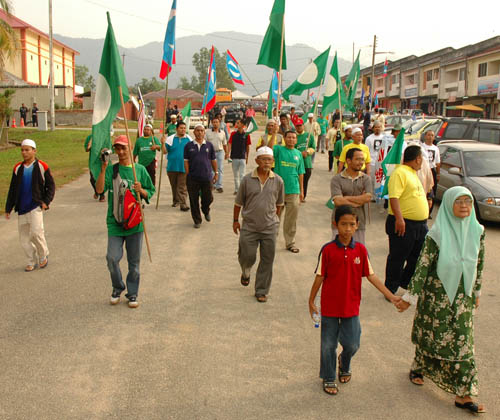
Nomination Day
In early hours of Sunday morning, as I later overhear talk among the aides in Khairy’s convoy, Dax and other campaigners go on a so-called “black ops”, pulling down some large PKR flags and posters. Dax apparently chided his less experienced colleagues for leaving behind a dismantled flag which allows the opposition to raise it back up pronto. His quick-‘n’-easy recipe for bringing down long lines of streamers: tie a water bottle to one end of a rope, throw it over the streamers, and once the bottle hooks the line, tie the other end to a car, and “Tarik! (Pull!)” [Updated with: Dax has categorically denied that the incident took place, and the writer apologises for not verifying the context or the accuracy of the conversation that he overheard. MalaysiaVotes.com apologises for not being more stringent in our fact-checking before we published. Dax says campaign materials without permits or party logos come under the jurisdiction of the local council. He says this is a safe seat and there is no reason for them to be involved in such malpractices. We’re concentrating on positive campaigning, he says.]
On Sunday morning, as Khairy’s seven-car convoy drives through a two-lane back road towards the nomination centre in Chembong, a Proton Wira with a PKR sticker suddenly swerves between the fourth and fifth car. Dax, in the fifth car with me, and carrying Khairy’s back-up copy of nomination papers, is not happy. He tells the driver, Rashid, to overtake the Wira, gets on his Blackberry, coordinating with the fourth car to box in the convoy intruder, ensuring that it cannot reach the third car (which is carrying the prime minister’s daughter and Khairy’s wife, Nori), and Khairy in the second car.
As our car pulls up beside the Wira, Dax winds down his window, holds out his hand and screams “Berhenti! (Stop!)” As Rashid edges the Wira to the side, it eventually loses interest and turns off. Petty one-upmanship like this incident and the bureaucratic pedantry of checking nomination papers take precedence over an entire morning that should just be an administrative formality.
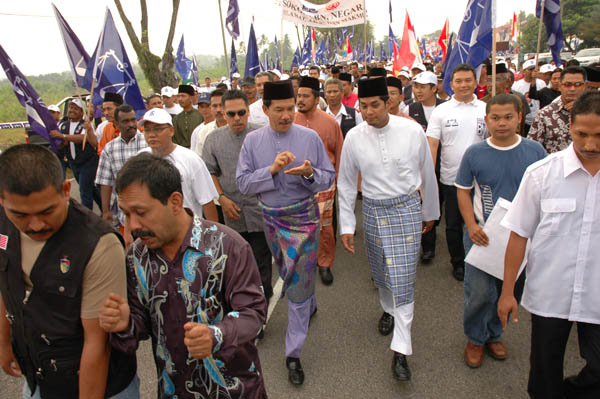
For the BN candidates (including the Negri Sembilan menteri besar Datuk Seri Mohamad Hasan who is contesting the Rantau state seat within the Rembau constituency), it is about affirming status and visibility in the party. Feted at a six-tent breakfast kenduri within walking distance from the nomination centre, party stalwarts hug and hobnob amongst the roughly 1,000-strong retinue of bike riders, flag-bearers and component party supporters – as well as those from one non-BN party, Datuk Nalla Karuppan’s Malaysian Indian United Party.
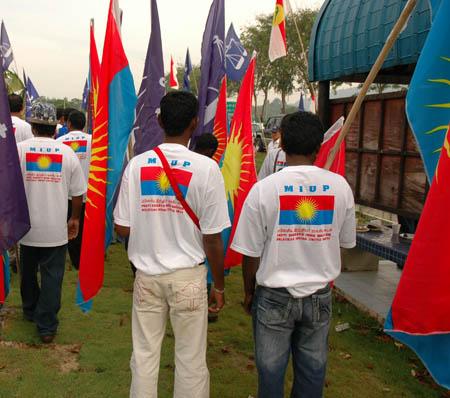
Outside the nomination centre, the contesting parties are kept about 100m apart, watched over by police. Here, the 200-odd PKR and PAS supporters win the vocal battle against the 1,000 BN supporters by sheer endurance, chanting and cheering for over two hours straight, pausing only for Election Commission announcements. They have the most interesting repertoire – from “Makkal Sakti” and “Hidup Hindraf” to “Kami duta kasih sayang” and “BN, BN, Barang Naik” – and outshine the BN’s, by now, staid “Hidup BN!” and “Sedia Gempur!”.
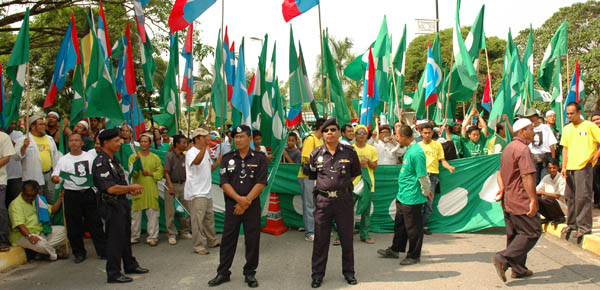
“Very relaxed”
“This is very relaxed,” says Dax. “(Whereas) by-elections are f—ing intense. Pengkalan Pasir was ten times more exciting, got fighting at every polling station. It was worse than Lunas. I was dispatched to this peti undi (polling station).
“PAS barricaded this ‘black’ kampung (a white area is pro-BN, grey uncertain, and black being pro-opposition). They didn’t let these Puteri Umno perayu undi [vote canvassers] go in. They had drain water in buckets to throw at them – and kampung [village] drain water is not like our KL drain water; these had been stagnant for 15 to 20 years.
“So I went to negotiate with the ketua pemuda [youth chief of] PAS who was blocking it, because KJ [Khairy] and Hisham were elsewhere. It’s not even a negotiation, it was just a show of power. Show your cards. (I said) ‘I’ve got the cops with me, I’ve got SB [Special Branch] with me…what have you got? He brought out his gedebe (Kelantanese gangsters) boys, they showed their drain water and parangs [machete]. I said ‘Ok, use it. I’m going to walk across the bridge right now.’ All the support came in, the security boys, the Pekida (Pertubuhan Kebajikan dan Dakwah Islamiah Malaysia which Abdullah is patron of) boys. I said, ‘You have to live here, we don’t.’”
Amidst all this locker-room braggadocio, Dax has the presence of mind to put things in perspective. “In
The NEP
Those are the exact three words that go through my mind during the interview with Khairy as he talks about “empathy” at the kenduri, surrounded by his entourage, kampung elders, local Umno leaders, and a campaign and media team of family members, including Nori.
When asked about the BN parliamentarian’s track record as being largely unquestioning rubber stamps, Khairy says: “The role of a backbencher is one that not only supports the government but also questions certain government policies and ministers if they feel the policies and legislation is questionable as far as the people’s welfare is concerned. Of course at the end of the day, party discipline must trump any other consideration and when it comes to a vote there must be a whip on discipline and you must fall in.”
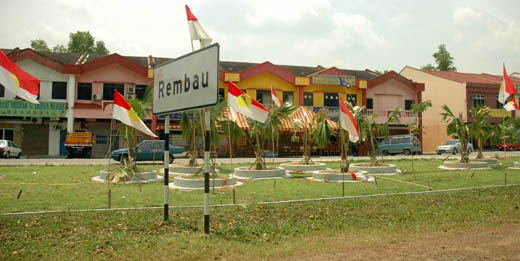
I won’t be the first to have questioned the contradiction of calling for a revival of the New Economic Policy (NEP) with its 30% equity quota for Malays – as Khairy did at the 2005 Umno general assembly – while appealing for a change of attitude amongst Malays to be competitive and not be a “bangsa bersubsidi” [“a subsidised race”] – as he did in 2007’s general assembly.
“I’m saying the NEP-type policies were implemented incorrectly,” Khairy responds as we continued our interview later in his car. “It didn’t go to those who really needed the help, so when I say we still need the quotas, it’s really directed at the true spirit of why they were introduced in the first place, which is to help those who really need the help – those who have little access to education, economic opportunities, not the fat cats of the world. It’s a problem of how to distribute the opportunities.”
“I don’t believe in a conservative or a neo-conservative view of economic management. I certainly believe that the government has a big role to play in running the economy. I would categorise myself more as a liberal in terms of economics where the government plays a bigger role.
“And that doesn’t just apply in terms of affirmative action for bumis, it also applies to helping the poor regardless of race and all that. The market doesn’t help the poor, the dispossessed, it doesn’t help people who don’t have educational opportunities. At the end of the day, Malaysia is a country that needs government intervention. Does that distort the market? Of course it does, anything exogenous from the market distorts the market, but the market doesn’t function perfectly, and we all know that.”
When I floated to Khairy an observation that I found online (made by ‘Pelanuk’ from the Berita Malaysia Yahoo! Group) to be especially apt, that BN rule was one of “‘responsive’ authoritarianism”, his non-denial allowed for a dig at the previous administration. “Responsive, I agree spot on, obviously,” says Khairy. “Authoritarian, I think that’s changing as well. We’ve gone a long way from a few years ago, it’s a much more open society, both by design and by default.
“By design, Pak Lah has deliberately tried to open things up for discussion for debate, maybe not all the way, maybe not satisfying some people, but to a large extent, parliament is livelier, the auditor-general’s report is taken more seriously… these things wouldn’t have happened before, and by default, you have the blogs, the internet.”
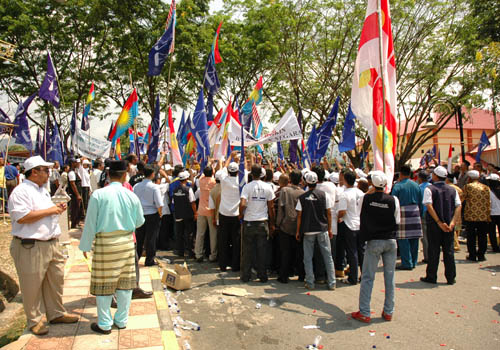
The BN campaign for Kelantan has come to be been seen as influencing the fate of Pak Lah’s premiership, come the Umno party elections. According to Khairy, Umno branch elections will be in April, division elections in June or July, and the general assembly elections slated for August or November. Virtually canvassing for votes all year round will take its toll on Umno politicians.
“It can be more vicious than the general election,” says Khairy. “The general election is widely seen as BN having disproportionate strength compared to the opposition, but Umno elections is more of a fair game.”
As for Kelantan, Khairy is predictably bullish. “After 18 years they can only frustrate people for so long. I can just hear the opposition saying ‘…and BN can only frustrate you for so long after 55 years.’ But you know, as somebody said, we may be authoritarian but we’re responsive.”
Chegubard on what ails Malaysia